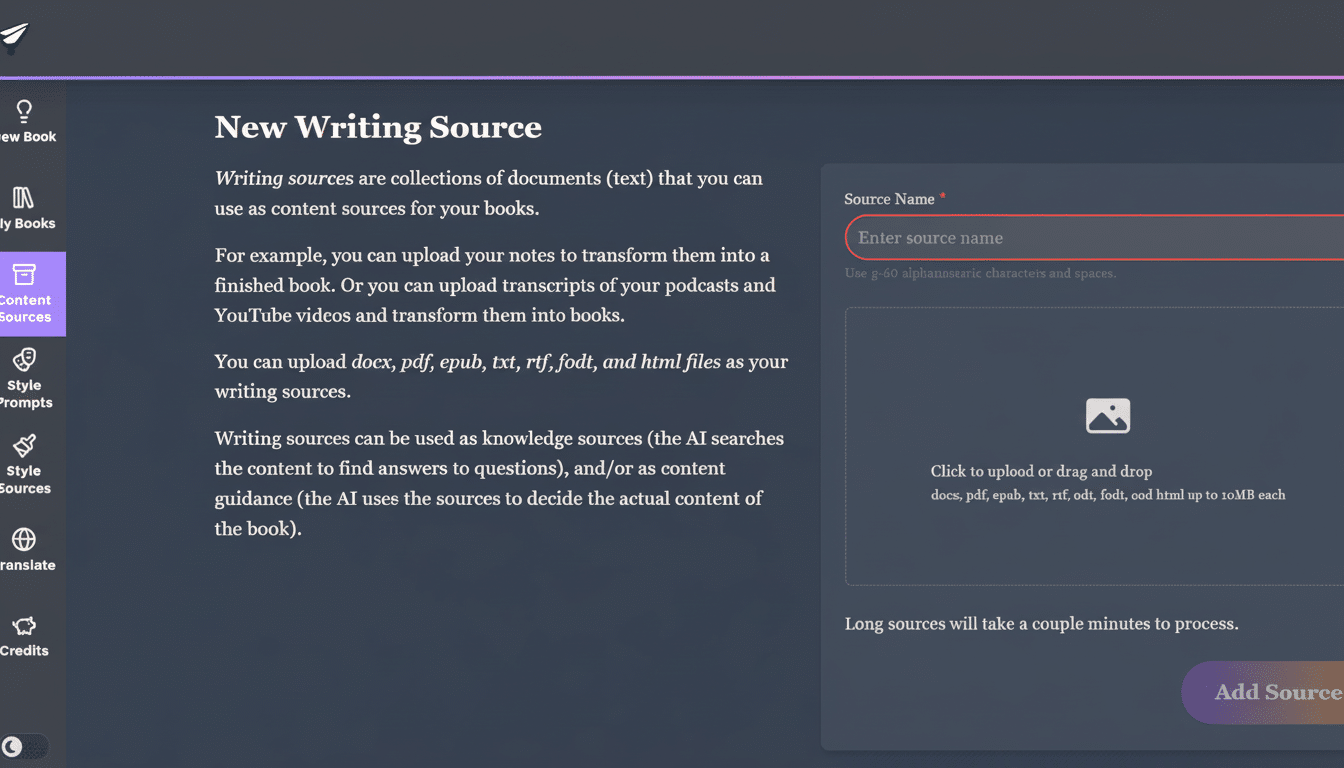If you’ve been wanting to pull a nonfiction idea together into a manuscript, the best deal in town right now is lifetime access to YouBooks AI for $49 (originally $540). It’s a dedicated drafting tool that supports shaping your outline, tone, and structure into a full-length book — then allowing you to tweak chapters inside an editor before exporting to publishing-ready formats.
YouBooks AI is not like a generic chatbot trained on small talk. Its multi-language support, citation suggestion feature, bibliography, and table of contents generators do the work for you, and if you are sharing through LaTeX or other typesetting programs, its format is well supported.
- What YouBooks AI really serves up for nonfiction writers
- Comparing the $49 lifetime with other deals
- Limits and responsible use when drafting nonfiction books
- Who this YouBooks AI book-writing deal is ideal for
- A quick process to road‑test it before you publish
- Bottom line on the YouBooks AI $49 lifetime deal

- Supports multiple languages
- Offers citation features
- Can export to PDF and ePub
- Nice creator tools
- Distributed via Kindle Direct Publishing or Gumroad
What YouBooks AI really serves up for nonfiction writers
Begin by feeding the app your subject, ideal reader, and preferred voice — professional, conversational, narrative, or how‑to. Pick the structure (say, step-by-step guide, personal development framework, or narrative nonfiction), and it writes the chapters to that blueprint. You can regrow sections, add research notes, and rearrange chapters without ever leaving the site.
The utility of the platform is in scaffolding — in rapidly extending a detailed outline into tens of thousands of words, replete with section heads, summaries, and reference prompts. The automatic table of contents and ePub/PDF export save a whole bunch of painful fiddling around that usually blocks new authors completely.
One common use case: a consultant turning a workshop into a practical handbook. Give the results, critical frameworks, examples, and voice guidance; AI will draft; then you go through to overlay your own best practices and clean things up.
Comparing the $49 lifetime with other deals
Most AI writing apps bill monthly, usually from $20 to $99 for mid‑level plans; the old-style book software (i.e., layout) is an additional purchase and does not include AI drafting.
A $49 one‑time license that has long‑form generation is a surprisingly aggressive price in comparison to subscription-based competition targeting writers.
The divide is even more pronounced for professional services. For what to expect in rolling rates, the Editorial Freelancers Association lists ranges around $0.03–$0.07/word for developmental editing (p. 4) and about $0.02–$0.04 per word for copyediting (can run from lower thousands on up for a 50,000‑word manuscript). Ghostwriting typically begins in the five figures. Even if you still employ an editor (recommended), an AI draft can shrink timelines and costs by providing a decent manuscript to edit.
Do read the fine print on any lifetime offer. Verify appropriate commercial-usage rights, any generation or fair‑use limits, how many seats are included, and what future updates are available. Lifetime deals are great when they secure core functionality that you can use on project after project.

Limits and responsible use when drafting nonfiction books
AI cannot substitute for research on the ground, or for lived experience. Large language models can hallucinate facts or misassign quotes. Regard it as a draft essay not yet taken to completion. Fact‑checking claims, verifying citations, and adding original insights is crucial — particularly in business, health, and policy topics.
Industry groups like the Alliance of Independent Authors counsel a transparent, ethical use of AI: Fact-check sources, don’t copy proprietary material, and make sure you can copyright any included content. Many publishers require such warranting of originality; conducting an originality screen and tracking your sources can protect you.
Who this YouBooks AI book-writing deal is ideal for
Entrepreneurs, consultants, and educators who already have course content or talks can use YouBooks AI to quickly turn frameworks into a sellable book. Niche creators building authority — on productivity, personal finance, and more — get a repeatable workflow for lead magnets, short books, and full-length titles.
Self-publishers who will be distributing through Amazon’s Kindle Direct Publishing, Apple Books, or Kobo Writing Life can take advantage of ePub export and chapter-level editing. For small shops, it’s a low‑risk way to prototype client books or research compendiums before proper editing takes place.
A quick process to road‑test it before you publish
Establish a specific promise (“You will by the end…”), your reader avatar, and 8–12 chapter promises. Give YouBooks AI the coverage, tone, and must‑include examples. Create the first drafts of your chapters and then immediately weave in your toolkit, case studies, and proprietary stuff.
Next, run a fact pass. Double-check what is claimed with trustworthy sources including government statistics, academic papers, and established fact-finding bodies such as Pew Research Center. Substitute verified sources for AI-generated citations. Then run a style pass to mold voicing and pacing, then a final formatting pass before exporting as ePub.
Bottom line on the YouBooks AI $49 lifetime deal
YouBooks AI won’t think for you, but it can bridge the gap between a solid outline and an editable manuscript. At $49 for lifetime access (normally $540), the math works out in favor of any serious nonfiction publisher, especially if you plan to write more than one book. Throw in tight fact‑checking and professional editing, and you have a practical stack for pushing out your next title at very little cost.

